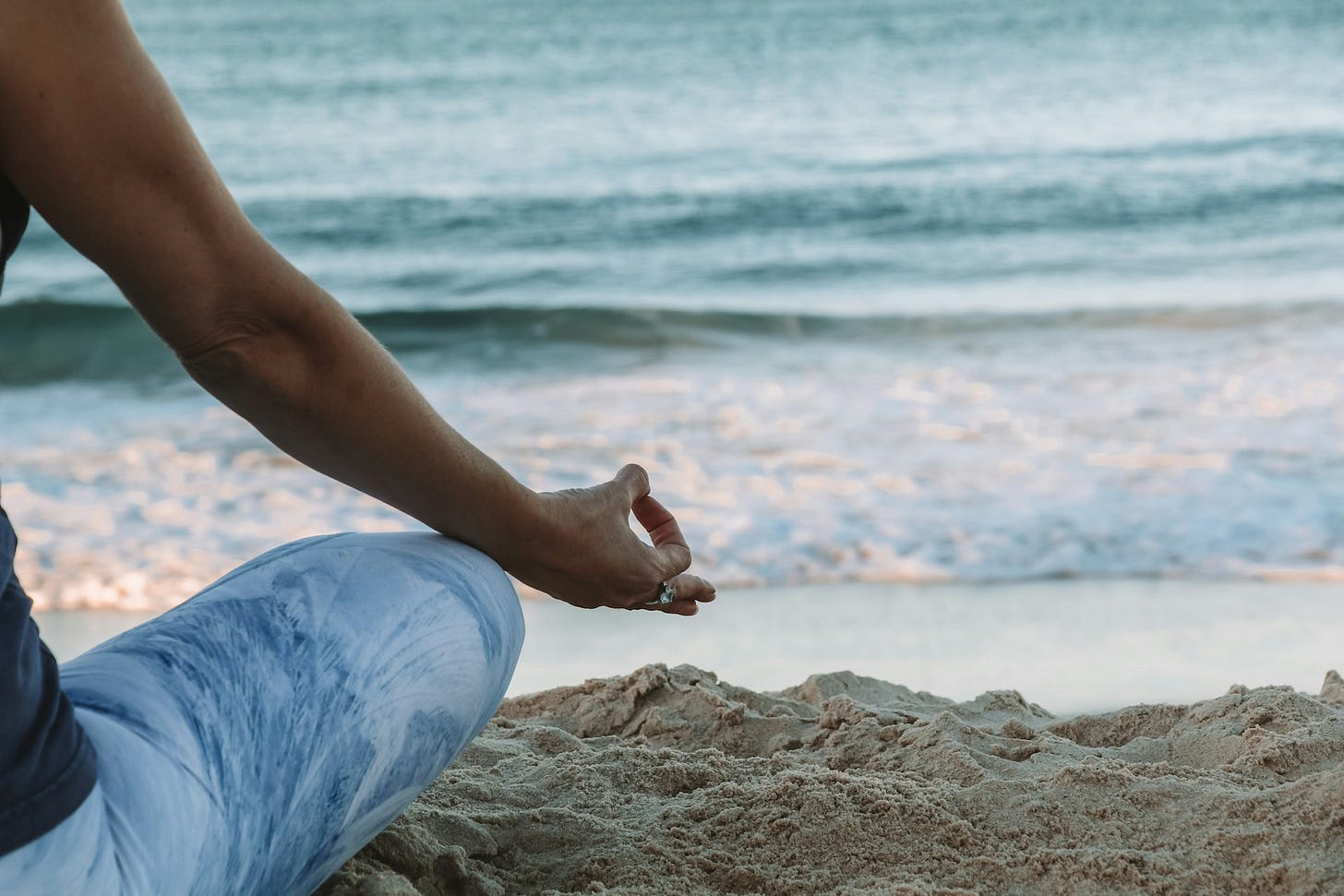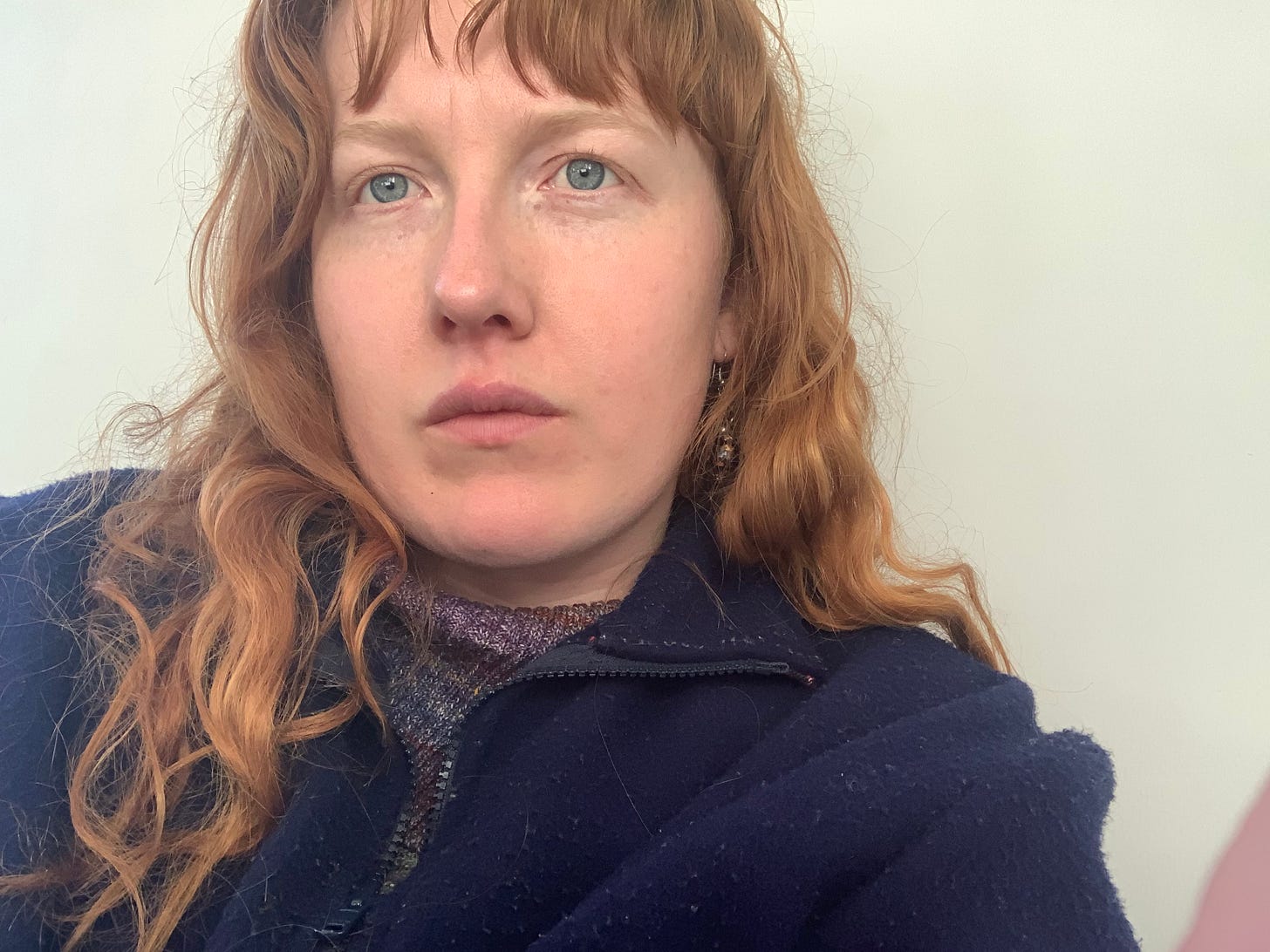“Finding yoga was like finding a missing piece to a puzzle for me” - A conversation with trauma-informed yoga instructor Elly
Curious about trauma-informed yoga? Join us for a free Embodied Slow Flow class on October 13th!
Welcome to Life after Trauma; I’m Clare Egan. I’m a queer Irish writer, on a mission to change how we think about life after trauma. Before we start, a quick reminder: Our next Monthly Creative Gathering will take place next Monday, September 29th at 7pm Irish Time. My goal with these virtual gatherings is to provide a space for folks to find community in their creativity. When I hosted The Artist’s Way earlier this year, community was what made the experience special. Many of us have been quietly toiling in our creative work for decades, hungry for a deeper sense of community and belonging. These monthly gatherings provide a space for the Life after Trauma community to chat about our stumbles, celebrate your wins and feel supported through every season of your creative life.
Let me know if you’d like to come along!1

Today, I’m delighted to welcome trauma-informed yoga teacher Elly. Elly and I connected last year when I took part in her Embodied Rest class. It was a tremendously enriching experience that I’ve thought about a lot since. I was thrilled when Elly agreed to host a trauma-informed yoga session for the Life after Trauma community.
I’m delighted to be able to offer this class for free to all members of the Life after Trauma community.
Sincere thanks to Social Entrepreneurs Ireland for funding this pilot session. If it’s of interest to the community (& Elly is willing) I’d love to make trauma-informed yoga classes a regular part of our community experience.
Class details:
📅 Monday, October 13th via Zoom
⏰ 7pm - 8.30pm (Irish Time)
🎥 A recording will be available if you can’t attend live. (Don’t worry - our cameras will be off as we’re doing yoga, so only Elly’s demonstration will be in the recording!)
📝 Participants will be asked to complete a short survey to measure the impact of the class. This will help me to apply for more funding to make these opportunities accessible to people who need them.
Here’s a short description of the class from Elly:
Embodied Slow Flow invites you to practice at your own pace, with options and space for pauses. There is an emphasis on noticing how your body feels rather than trying to make the Yoga ‘look’ a certain way. The practice will invite you to find shapes, movements, sensations, breath or other elements that allow you to feel supported in your body and your experience at any moment. It’s open to all and no experience is necessary. The session will conclude with a yoga nidra practice that will invite you on a journey around your body featuring plenty of invitations and simple inclusive language.
In advance of our class, I wanted to introduce Elly and invite her to share a little about her background with trauma-informed yoga and what it has brought to her life. I hope you enjoy our conversation!
Hi Elly! Thanks so much for being here. Would you like to introduce yourself to the Life after Trauma community?
I’m Elly, a mother, yoga practitioner & facilitator & yoga nidra lover.
Yoga has been incredibly helpful in my own journey. I really don’t know where I’d be without it. My offerings are centered around connecting to the intuitive wisdom of your own body, mind, heart through yoga nidra, pranayama, restorative yoga & intuitive movement.
Everything I share during a practice is invitational, you’ll never be forced to do something that doesn’t resonate with your body. I am fascinated by our innate ability to feel, and communicate with, the unseen - the inner landscape of our bodies, our intuition, our dreams and the spaces inside us ready for healing.
As a survivor of trauma, I come to this work with a lived experience of the effects of trauma on both the body and mind. I, like many people who have experienced trauma, have tried many different healing modalities to help. However, finding yoga was like finding a missing piece to a puzzle for me. I understand first hand how important yoga and movement practices can be in safely moving within and through our own individual journey with trauma.
I truly believe yoga is a liberating & magical practice and I feel very honoured that I have the opportunity to share it with others.
Could you share a little about your own yoga practice and what it has brought into your life?
Oh wow what a question to begin with. Yoga has been part of my life for over a decade, I was always intrigued by the practice as a teen and used to buy yoga dvds so I could practice at home. Then when I was 22 yoga became an integral part of my own well-being toolkit as I navigated my own trauma and also stopped drinking. It was a time of upheaval but yoga was my anchor throughout. My own practice has shifted and changed over the years but finding trauma informed yoga really helped but tune into my own body. It helped me realise one day I might like to do a really active practice and other days I might rest in a supported child’s form for a few minutes. Yoga has brought clarity and agency into my life, it helped me acknowledge I have a choice with my body.
For those who may be new to the idea, what makes a yoga practice “trauma-informed”?
There are many answers to this question but from the folk I have trained with, invitational language is what makes a yoga practice trauma informed. Of course offering choices also makes a practice trauma informed but the use of invitational language can allow participants to decide if they even want to engage with what the facilitator is suggesting.
Another key element is that the facilitator practices alongside the participants, this is usually referred to as power sharing. In a trauma informed session a facilitator won’t walk around the room commanding participants to do shapes. They are also on their mat inviting participants to explore shapes/sensations alongside them.
Many survivors experience triggers when they engage with exercise. In my own life, there were many years when I was just too traumatised to be able to get on my yoga mat. For me, self-compassion and patience were essential in moving through those triggers but it was really, really difficult. Do you have suggestions for folks who are managing triggers on the mat?
Self-compassion is so important , Kristin Neff has done some great work around compassion/self compassion that is presented in a trauma informed way. One useful tool for managing triggers is a practice called orienting. It is a process of inviting your senses to open to the environment you find yourself in. That could mean noting three or four objects and naming them at the start of a session and then if you feel overwhelmed at any point you can look to those objects you named at the beginning. Or you could notice objects that are red for example and refer back to them in times of overwhelm. Another practice could be to notice your feet or perhaps place your hands on the floor and notice the connection between your body and the floor.
These are really useful suggestions, Elly. In the past, I felt a lot of distress around my hips/pelvis, so when lying in shavasana I found it useful to keep my hands on my hip bones as a tangible reminder to ground myself. I also prefer to do yoga with my eyes open. Are there practical modifications or grounding strategies you recommend for people?
I always start a session with an invitation to explore the practice of orienting and then at the end we also re-orient, it can feel like a full circle moment and a supportive way to end a session. Another useful practice for grounding can be heel drops, essentially you lift one or both heels off the ground and then drop back down to the floor and if it feels ok you can notice that connection between your foot and the floor.
Earlier this year, the Life after Trauma community explored the intersection of creativity and recovery through The Artist's Way. We used the iconic book as a starting point, but adapted it to create a gentle, low-commitment container for folks to experiment with their creativity. I’m curious if you see parallels between creative exploration and yoga?
Absolutely, I really believe the practice of Yoga Nidra can be a helpful way to explore your creativity. During a practice of Yoga Nidra the participant moves through the five brain wave states and this process really shifts one from their thinking brain into their feeling body and sometimes those creative gems shine through.
Aside from the classes I’ve done with you Elly, I haven’t been to a traditional yoga class in a long time. I roll out my mat most days and use a combination of YouTube videos and my own instincts/needs to shape my yoga practice but sometimes I do miss the community aspect of the practice. How do you think about yoga as a community practice? Yoga has obvious benefits for us as individuals, but I’m curious how you think about it beyond that individual lens.
Isn’t it such a shame that more yoga spaces aren’t trauma informed? Unfortunately studios don’t really want to go down that route of offering trauma informed sessions, I’ve asked and haven’t had any luck. I really miss that community aspect as well and that’s why I’m in the very early stages of setting up an online trauma informed yoga community on Patreon. Everything takes a bit longer to come to fruition now because I have a child but I hope to have something up and running by the end of the year. It’s been something I’ve wanted to do for years because I have felt very alone at times through my own healing journey. I’ll keep you posted on the progress and hopefully we can create a wee online trauma informed yoga space.
This sounds amazing, Elly! I’m so excited to see it come to life. For those who may be hesitant, what can they expect from a trauma-informed yoga session with you?
When participating in a trauma informed yoga session facilitated by myself you will expect lots of invitational language, options to explore movement or stillness in a shape. There is always an invitation to do your own thing or maybe follow my guidance. When facilitating on Zoom folks can have their cameras off if they wish. I always offer movement that is accessible for all bodies.
Many people may not realise that yoga can be part of trauma recovery alongside therapy. How do you see your work complementing other healing modalities or practices?
The useful thing about this type of yoga is that it invites the participant to be in the present moment with their body and that really compliments the modality of talk therapy which can be focused on processing what happened in the past. Trauma informed yoga can be helpful because it offers a non verbal, embodied path to healing that supports nervous system regulation, body awareness and emotional regulation.
Do you have any questions for the Life after Trauma community in advance of our class? We have an active comment community, so if there are things you’re curious about or ideas you’d like folks to think about before we gather for the class, please share them here.
I’d love to know if there is anything folks really don’t like when participating in a yoga session - certain words perhaps? If they have any more questions for me - I’ll happily answer.
Thank you so much for being here, Elly! I can’t wait for our class on October 13th.
💕 If this piece resonated with you, please tap the heart below to help spread the word.
💬 In the comments, please let us know if you’ve any questions or concerns about joining the class. As discussed above, Elly’s approach is invitational rather than directional. If something doesn’t feel good in your body, you’ll be encouraged to listen to your body’s wisdom. This class is all about finding a new way to inhabit our bodies, and deepening into the somatic experience of being alive. It’s not about achieving particular poses, or looking a particular way. If you’re working around injuries or other limitations, you are very welcome here.
If you enjoyed this essay, you might also appreciate:
The gathering is open to all paid subscribers. If you’d like to attend but can’t manage it financially right now, feel free to contact me and we’ll work something out!







I love trauma sensitive yoga so much - for everybody, not just those who identify as having experienced trauma. It's such a beautiful way of guiding people into reconnection with their internal world and handing back power over our own bodies. Training as a yoga teacher 12 years ago was a game-changer for me in my personal healing and my client work. I'd love to be able to join you, but unfortunately it'll be 7am here and I'll be in the pre-clinic morning rush at that time, but what a wonderful generous offering ❤️
What a wonderful initiative Clare; Elly sounds amazing and I would love to attend. The trauma around the grief of losing my mother to dementia still feels so raw, all these months later. Just today on the yoga mat, doing myofascial release with a massage ball in my hip, the tears just poured out. What a beautiful offering to our community.💗